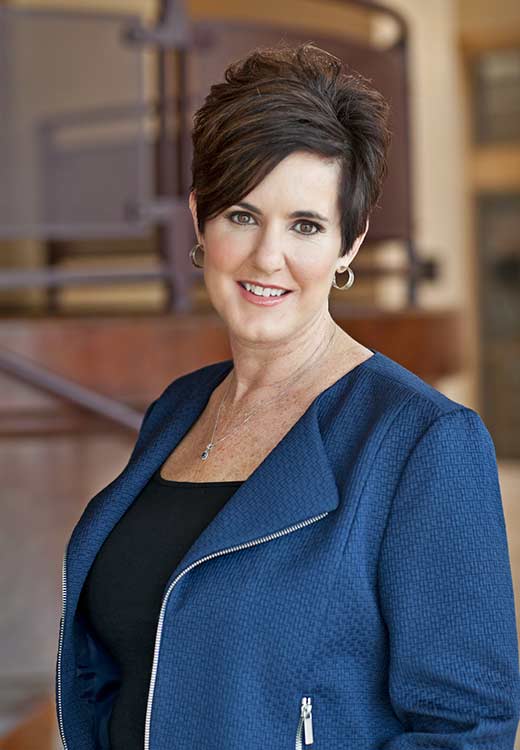Theresa Rodgers Keeps Faith and Momentum at an All-Girls Catholic High School
Weathering crises by dealing directly with them
By Ed Goldman
My lunch chat with Theresa Rodgers, president and chief executive officer of St. Francis Catholic High School, takes place on her 49th birthday and ninth wedding anniversary. It also follows some trials by fire from which she and her school emerged relatively unsinged and rededicated to social justice.
Rodgers rode out more than a year of controversy involving the two banes of modern civility, political correctness and “wokeness,” at St. Francis. At issue were, in part, a student’s misguided attempt to kid her closest friend, a Black girl, by “corking up” for a photo, as they used to call it in the late 1800s when a white performer wore blackface on stage. After round robins of apologies, indignant emails and even an organized protest, Rodgers had Dr. Jason Javier-Watson, the assistant principal of 9th and 10th grades at St. Francis, create the school’s Racial Reconciliation Plan. The document, which includes a multi-pronged action plan to address future issues, sets the stage for the discord and then includes a profound apology. Here’s an excerpt:
Theresa Rodgers
“The recent murders of Ahmaud Arbery, Breonna Taylor, and George Floyd spurred an outpouring of sadness, anger, and grief across the country. Uprisings against racial injustice subsequently occurred in cities, suburbs, and even in rural areas not often in the news. These uprisings represent a struggle larger than the fight for justice for an individual; the protests are a statement about the unequal treatment experienced by Black and African American people in many areas of daily life.
“In the weeks after George Floyd’s death, many of our students and alumnae felt that we as a school community did not stand in solidarity with them during this painful time. Furthermore, a social media post meant to honor the struggle of our students of color was instead experienced by many as deeply hurtful because it was too little, too late, and not an authentic statement given our actions as a school. Furthermore, the comments on the post were filled with stories of mistreatment; and worse, that we neglected to act to protect our students in the face of this mistreatment.
“We are truly sorry for our actions and inactions that failed to affirm and protect the dignity of our students and families of color. Every time we did not address a racial incident; every time we did not adequately respond to the racial mistreatment of students of color; and by failing to proactively create a more inclusive campus environment, we have sinned.”
That’s quite a manifesto, light years apart from the usual political rhetoric of “Were mistakes made? Yes. Are we sorry? We are, if we hurt anyone.”
All of this took place during the depths of the COVID pandemic, leaving Rodgers and her administrators to “try to address very emotional topics regarding race and social justice in sometimes heated conversations with parents over Zoom—which I don’t recommend.” Meanwhile, she was losing her beloved dad to Parkinson’s Disease, a struggle he lost “without losing his faith,” she says admiringly.
Having followed some of the school’s ordeals in the local news media, I expect to meet an embittered, press-wary, self-protective individual. Instead, I encounter a remarkably upbeat, resilient and compelling conversationalist. Faith can do that.
St. Francis, which is in its 81st year, is the largest all-girls school west of the Mississippi (you can find several such schools in more than 30 states). It’s governed by the Catholic Diocese—and so, in a way, is Rodgers, who credits her religion with helping her navigate through crises.
Musing briefly on the sex-abuse scandals that have engulfed the Catholic church—which are unrelated to last year’s tempest at her school—Rodgers says, “I have to keep my eyes focused on Christ, not man. The church has been around more than 2,000 years, and faith brings me purpose and hope. Men are just men. We’ve had great Popes and terrible ones, good priests and bad ones.”
Rodgers earned her bachelor’s degree in English at the University of La Verne, a private university in Southern California, and her master’s in educational leadership at UC Berkeley. She then started her career as a teacher at an all-girls Catholic high school in American Samoa’s Pago Pago (which is pronounced Pongo Pongo, in case you ever get that question on “Jeopardy”).
“I lived with three other brand-new teachers,” she says. “It was like spending two years in a sort of Catholic Peace Corps.” She smiles at the memory.
Following her South Pacific sojourn, Rodgers served as a teacher and then assistant school principal in the San Francisco Bay Area for two decades. She joined St. Francis eight years ago, where she works with a seven-member volunteer board and oversees “about 120 employees, 85 of whom are teachers.”
But, she’s quick to point out, “My job is more about building relationships, not running the academic side of the school. We have a principal and teachers who do a wonderful job in that area.” She adds that her own work focuses on “the five Fs: faith, finances, fundraising, future and facilities.” She laughs slightly after enumerating her responsibilities and makes a face, as though suspecting what she said was glib—though I’m thinking how nice it must be to have an alliterative list of job duties.
Robert Rodgers, Theresa’s husband, owns a CNC (computer numerical control) shop, where machines “enable the creation of parts and components that would usually be impossible to create manually (such as mills and lathes),” according to the Universal Technical Institute’s website. (You don’t think I knew that on my own, do you?) She lovingly calls him Big Boy (“He’s, like, 6’6!”) and says that one of the things that drew her to him was that he “can talk to anyone when we go to receptions and events related to my job and be very comfortable—but mainly I love that he can fix anything. My dad was the same way. You know what they say about the way to a man’s heart is through the stomach? Well, let me tell you, the way to a woman’s heart is through the toolbox.”
This makes me laugh. My doing so makes her do the same. And in the span of a lunch hour, Theresa Rodgers has just built another relationship.
Ed Goldman's column appears almost every Monday, Wednesday and Friday. A former daily columnist for the Sacramento Business Journal, as well as monthly columnist for Sacramento Magazine and Comstock’s Business Magazine, he’s the author of five books, two plays and one musical (so far).













